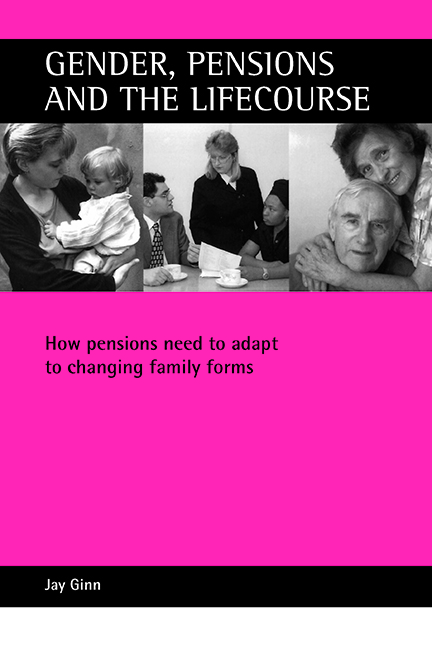Book contents
- Frontmatter
- Contents
- List of tables and figures
- Acknowledgements
- one Trends in gender relations, employment and pensions
- two Choice and risk in pensions: gender and class inequalities
- three Pension prospects for minority ethnic groups
- four Changing patterns of partnership: divorce and pensions
- five Impact of motherhood on pension acquisition: differentiation according to education
- six Gender and pensions in the European Union: towards an independence model?
- seven British pension policy: a gender perspective on alternative rescue plans
- References
- Appendix Statistical tables
- Index
seven - British pension policy: a gender perspective on alternative rescue plans
Published online by Cambridge University Press: 20 January 2022
- Frontmatter
- Contents
- List of tables and figures
- Acknowledgements
- one Trends in gender relations, employment and pensions
- two Choice and risk in pensions: gender and class inequalities
- three Pension prospects for minority ethnic groups
- four Changing patterns of partnership: divorce and pensions
- five Impact of motherhood on pension acquisition: differentiation according to education
- six Gender and pensions in the European Union: towards an independence model?
- seven British pension policy: a gender perspective on alternative rescue plans
- References
- Appendix Statistical tables
- Index
Summary
Few outside government deny that the British pension system is now in crisis, although the exact nature of that crisis is variously defined and gender issues are rarely considered. Critical assessments of current policy abound in the evidence submitted to the Work and Pensions Select Committee’s inquiry (Work and Pensions Committee, 2002), from pension providers and advisers (over 25 submissions), trades unions including the TUC (10), employer organisations including the Confederation of British Industry (2), pensioner organisations including the National Pensioners Convention (7), major pensioner charities (2), think tanks (4), consumer groups, academics and other individuals.
In this chapter the concerns expressed by a range of such commentators are outlined. The reasons why reaching a pensions consensus has proved so difficult are discussed and the main types of rescue plan proposed are considered, focusing on the gender implications of each. Concerns can be grouped into three main areas – pensioner poverty, erosion of saving incentives and the crisis of private pensions.
Pensioner poverty
Member countries of the EU have agreed that pensions should be adequate to ensure that older people can enjoy a “decent standard of living” (EC, 2002, p 5) but the British government has not said what income this would require. Many experts believe that neither the basic state pension nor the means-tested Minimum Income Guarantee (MIG) is adequate, and that the levels of pensioner poverty in Britain, especially among women, are unacceptable (see Chapter Six).
Cuts in state pensions are set to continue, so that wage replacement rates will decline even further in future and the pensions poverty trap will widen. The government’s answer is to expand the system of means-tested benefits through a Pension Credit from October 2003. This will introduce a taper into means testing so that 40% of income above the full basic pension is lost instead of 100% as at present, helping those with incomes slightly above the MIG but also drawing over half of pensioners into means-testing in 2003 and an even larger proportion in future. The government claims the Pension Credit will help women but many older women on low incomes will miss out:
- Type
- Chapter
- Information
- Gender, Pensions and the LifecourseHow Pensions Need to Adapt to Changing Family Forms, pp. 97 - 112Publisher: Bristol University PressPrint publication year: 2003



